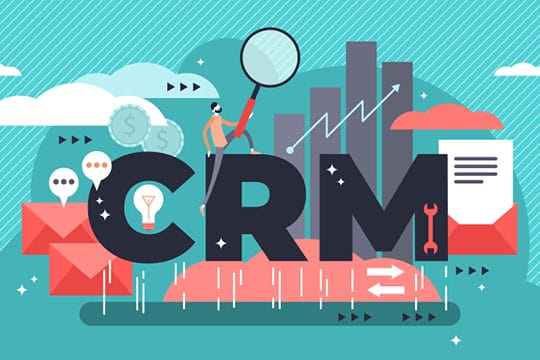New technologies are created daily. In today’s time, it can be a new widget or app that promises to make your marketing and business strategies more effective, efficient, and productive. While some types of technologies are more useful than others, there is one in particular that is quite handy – CRM (Customer Relationship Management).
A CRM system can be quite a useful tool when deployed properly. It can easily manage all your employees’ communications and interactions with customers and prospects. You will also be able to identify all the opportunities you may need for additional follow-up and nurturing.
Selecting the right system for customer relationship management for your company will depend on the customers, your employees, the type of business, etc.
What is CRM?

Before we dive into the benefits of CRM, let us first learn the basics. As mentioned above, CRM stands for Customer Relationship Management; it can be defined as software that can help manage your relationships with your customers and prospects.
The CRM tool can be used to track all the notes, data, and interactions with prospects or customers. The data is stored in a central database and can be accessed by several authorized people within an organization.
CRM helps streamline new companies’ management, accounting, customer service, marketing efforts, and sales. Authorized people within the organization can access and edit data and information to provide the best customer experience to any particular client.
Recommended for you: What is C-SCRM and Why Would You Need it in your Business?
What are some benefits of CRM?

Now that you have a basic idea about CRM, let us learn about some of its benefits:
1. Better customer service
Modern CRM tools offer a wide range of functionalities. However, the original use of these tools was to improve the relationship between the business and the customers, which is one of the most important benefits of CRM.
A CRM tool will streamline and manage all your contacts and provide you with the required information, like messages, purchase records, and demographics across all channels. This data will also be accessible to the authorized individuals in your company.
This will ensure that you and your employees have all the information and data about the customer at your fingerprint and provide a better customer experience. In turn, this will boost customer satisfaction.
2. Better sales
As mentioned previously, a CRM tool will help streamline and improve your sales process by automating key tasks, building a sales pipeline, and analyzing all data related to sales in a centralized location, increasing productivity and sales. CRM makes the entire sales process more efficient, which helps you close opportunities in your pipeline and accelerate team goals for everyone. Sales teams are able to save production costs and boost sales revenue since order processing and creating quotes are automated in CRM.
With the help of CRM, you will be provided with a reliable step-by-step sales process that can be used by your company employees and be tweaked to deal with different scenarios.
3. Better customer retention
First, you need to find leads. Some tools allow you to find leads and quickly create email lists, so these steps will definitely not be a problem. A database of millions of profiles will provide you with reliable contacts for your target audience. After you have procured and converted the leads, you need to start retaining them as loyal customers.
If your company has a high customer turnover, it can harm your business. Yes, it can disrupt your cash flow and diminish turnover. Therefore, you can make use of CRM to find customer-related information so that you can encourage repeat business.
With the right use of CRM, you will be provided with user behavior tracking, customer support automation, automated ticketing, and sentiment analysis to find out your problems and address them accordingly.
4. Detailed analytics
Having a lot of data about your prospects and customers is important. But, you also need to know how to clean CRM data and understand what it means. Most CRM software and tools feature an in-built analytic decoder. This will break down and contextualize the data for you. You can easily understand the metrics, like demographic information, bounce rates, click-through rates, etc.
5. Higher efficiency and productivity
Most CRM tools utilize marketing automation technology to eliminate menial tasks like drip campaigns. With this, you will free up your employee’s time so that they can focus on other tasks, like creating new content.
Additionally, you will ensure that no tasks are forgotten, like sending the right emails to the right people. These CRM tools often feature a dedicated dashboard to help you check how the different business strategies and processes work and show which areas can be improved.
6. Centralized database for all data and information
One of the best aspects of using CRM for your business is that you will be provided with a centralized database that contains all the required information for your customers. This information can be accessed by authorized employees who need it.
For instance, the sales representative team of your company will understand what the customers are looking for. If the prospects and customers have already interacted with your company, the CRM tool will keep a record of the conversation that you can use for a future sales pitch and/or marketing effort.
Overall, you will save much time and effort that you would otherwise spend digging through old records and files. It also offers a more productive experience for your prospects and customers.
You may like: 5 Reasons Why Does Your Business Need a CRM.
7. Better communication with your potential leads
Most of us consider lead nurturing a complicated and tedious process. To effectively nurture leads and manage every client, it’s critical to make use of all the functions of your customer relationship management (CRM) software. With the help of CRM, you can manage and automate the process. Additionally, the tool will also send alerts to your employees, like the time that you can get in touch with the prospects as well as all the interactions via phone calls, emails, text messages, etc. You’ll be more prepared for any client meeting or contact if you have all the information you require in one place.
8. Better segmentation of the customers
When you receive hundreds and thousands of contacts, it can become overwhelming and unwieldy. For instance, you would be interested to know which customers want to check out an email provided by you about a new product or service. CRM tools can easily segment your contact list automatically based on various criteria so that you can find any customer more easily. You can sort your contacts based on buyer stage, age, gender, location, etc.
With the help of automation, marketers will have a better understanding of the customers. Armed with relevant information, you will be able to have a more valuable interaction with them. For example, you will no longer have to write down a general email to all your customers. Instead, you can send personalized emails based on the customer’s values, interests, and preferences.
9. Automate the sales reports
CRM can help your employees organize and collect data about prospects and current employees. The CRM dashboard and the reporting feature will allow you to manage and automate various business processes and pipelines. You will also be able to evaluate the performance of your employees, check their progress, and track their goals and quotas.
10. Better sales forecasting
When it comes to any business operation, you will have to keep reviewing your performance in the past and plan strategically. A precise sales forecast can be an effective tool for your company. They enable you to make wiser business choices regarding hiring, defining objectives, and budgeting. CRM tools can provide you with automated sales reports to identify key trends. You will get an idea of what you should expect from sales cycle performance in the long run. You will also be able to keep adjusting your metrics and goals to meet your business goals. Your ability to modify your whole business strategy will improve with the accuracy of your sales forecasting.
11. Better internal communication
Apart from improving communication between you and your customers/prospects, CRM can allow easier communication between employees in the same company or organization. You can check how your employees engage with your customers, which will help maintain a common brand voice.
CRM will also allow you to send alerts or notes to other team members, send emails and messages, tag each other on projects, etc. without having to switch from one system to another.
You may also like: 6 Reasons to Integrate Your Website Contact Form With CRM.
Final thoughts

In today’s time, every business will benefit from using a CRM system. As a merchant, you will have critical insights about your customers and the required marketing opportunities. You will also be able to collaborate with different team members for larger projects. Customer service representatives and developers can utilize CRM systems to resolve customer problems and track bug reports.
As you can see, the uses of CRM tools are nearly endless today. These CRM tools offer many benefits to companies and brands, finding new customers and retaining old ones.
If you have any questions about this article, let us know in the comment section below. Do you have some other CRM benefits in your mind? Please share it with us.





